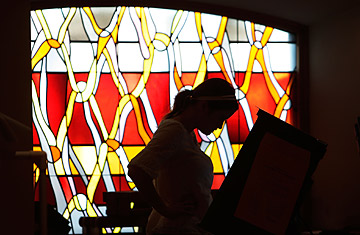
(2 of 2)
The main reason is geography. The largest percentage of white Evangelicals are in Southern states that were never in play for Democrats. They were therefore never part of any outreach effort — Obama's 50-state strategy didn't involve sending campaign staff to organize Alabama Bible colleges. Instead, the Obama camp focused its energy on a handful of battleground states with sizable Evangelical populations, including Colorado, Indiana and Michigan.
In those target states, Obama both outperformed his national average among white Evangelicals and chipped away at the GOP's 2004 advantage. In Michigan, where the state party began building relationships with social conservatives in the western half of the state during the 2006 election cycle, Obama won 33% of the white Evangelical vote, a 12-point shift from 2004. The campaign's Evangelical outreach coordinator spent the last weeks of the race in tightly-contested Indiana, with impressive results — 30% of the state's white Evangelicals voted for Obama (a 14-point gain), and the Democrat split the Catholic vote with McCain (a 13-point gain).
Even Colorado, where Kerry won a measly 13% of the white Evangelical vote in 2004, proved relatively fertile ground. The Obama camp reached out to moderate Evangelicals in Dobson's base of Colorado Springs, bringing in popular Christian author Donald Miller as a campaign surrogate. The result was a 29-point shift in the vote on Election Day for Obama. By contrast, in a state like Iowa, where the campaign had little to no religious outreach presence, the white Evangelical vote was unchanged.
See pictures of presidential First Dogs.
And that points to the second reason Evangelicals didn't shift in greater numbers: scope. The small gains that Obama made in the battleground states targeted by his religious outreach staff were the results of just six weeks of activity leading up to the election. At the beginning of the summer, after Obama clinched the Democratic nomination, his campaign announced an ambitious plan to engage young religious voters at Christian music festivals, at house parties, and through Evangelical and Catholic surrogates. But by the time fall arrived, the effort — originally called the Joshua Generation — had still not materialized. Finally, in the last week of September, the campaign set up a speaking tour for Miller and a few other Evangelical authors.
The campaign missed an opportunity to pursue and persuade younger Evangelicals in a sustained way and possibly welcome a new generation of voters into the Democratic coalition. As a September survey from Faith and Public Life found, younger Evangelicals are much more likely than their older counterparts to identify themselves as moderate or liberal. And their political positions match that orientation as well — they support expanded government and diplomacy over military intervention. Yet they were no more likely to vote for Obama than older Evangelicals. It's possible that social issues are still a stumbling block. Younger Evangelicals are even more opposed to abortion than their parents. But it's also likely that the cultural identification between Evangelicals and the GOP is so strong that Democrats will need to invest more time to court them and ask for their votes before a shift can take place.
Finally, there are unquestionably theological and racial reasons for the continued alignment of many white Evangelicals with the GOP. "There is a different flavor of Evangelicalism in the South," says political scientist John Green, an expert on religious polling. Obama's gains among Catholics were driven by Latino and white working-class Catholics for whom the economy trumped all other issues. But for lower-income Evangelicals in Southern states, that wasn't enough. Even in states that Obama carried, like Virginia and North Carolina, his percentage of the white Evangelical vote was much lower than in the Rust Belt. And in a state like Georgia, which at one point looked like it could be close, white Evangelical support for McCain may have proved pivotal. Kerry won only 16% of the vote in 2004, but Obama barely walked away with 11%.
James Dobson can take heart in one Election Day outcome. Despite predictions that Evangelicals might stay home from the polls this year, they actually increased their share of the electorate from 24% to 26%. This year, 3.5 million more Evangelicals voted than in 2004. In an ordinary year, that may have provided an edge for McCain. In this extraordinary election, however, 2 million of those additional Evangelical voters ended up on the side of Obama.
